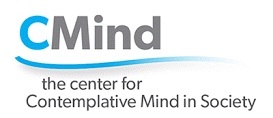Ruth King's Blog, page 6
April 1, 2020
The Washington Post’s Interview on Liberate App
“Thinking meditation could help cope with micro-aggressions? There’s an app for that!”
The post The Washington Post’s Interview on Liberate App appeared first on RuthKing.net.
March 30, 2020
Exploring Interdependence Through the Lens of Blackness, Sponsored by C-Mind
This engaging webinar, open to all people of all ethnicities, invites us to deepen our understanding of interdependence and contemplative dialogue by exploring the wondrous ways in which our lives have been enriched by the resilience, creativity, and leadership of Black people. Through meditative reflections, we bring to awareness the Black threads in our lives that have inspired a tapestry of reverence, connection, and healing. Ruth and Kamilah, through their joyful example, illustrate how contemplative and extemporaneous dialogue about the contributions of Black people can stimulate insight, inclusivity and unity. Through this we can begin to both notice and celebrate our undeniable interdependence. There will be ample time for questions and reflections, as well as guidance and inspiration for future contemplative dialogue. This webinar was sponsored by:
Save the Date for Further Discussion: June 7th from 3-5pm ET!
https://ruthking.net/wp-content/uploads/2020/03/Exploring-Interdependence-through-the-Lens-of-Blackness.mp4
Resources from our presenters:
June 7th, 3-5 pm ET/ 12-2 pm PT - Save the date for the next online workshop with Kamilah and Ruth. Details and registration link forthcoming!
June 20th, 3-5 pm ET/12-2 pm PT - Save the date for Cultivating Resilient Joy, a webinar with Kamilah Majied and Vaishali Mamgain. More information can be found at www.joyfullyjust.com
August 8-9 - Understanding “Us & Them” Power Dynamics in Groups, a training with Ruth King and Dr. Barbara Riley. For more information visit https://ruthking.net/event/us-them-training/
Racial Affinity Group Development Programs and Mindful of Race Training Programs are offered by Ruth King. More information can be found at www.ruthking.net.
Recommended readings from our presenters include all works by Toni Morrison, Alice Walker, W. E. B. Du Bois, Zora Neale Hurston, and James Baldwin.
 Dr. Kamilah Majied is a mental health therapist, clinical academician, and internationally engaged consultant on inclusivity and contemplative pedagogy and practice. She teaches clinical practice and research, employing psychodynamic, cognitive-behavioral, mindfulness-based, and artistic approaches to well-being. Kamilah has also practiced and taught Buddhism and mindfulness practice from several perspectives including mindfulness-based cognitive therapy, mindfulness and racial justice, Buddhism and mental health, and mindfulness practices to preserve the environment. She gave opening remarks at the first White House Conference of Buddhist Leaders on Climate Change and Racial Justice, where she also facilitated a dialogue on ending racism amongst the internationally represented Buddhist leadership. Read Kamilah's full bio here.
Dr. Kamilah Majied is a mental health therapist, clinical academician, and internationally engaged consultant on inclusivity and contemplative pedagogy and practice. She teaches clinical practice and research, employing psychodynamic, cognitive-behavioral, mindfulness-based, and artistic approaches to well-being. Kamilah has also practiced and taught Buddhism and mindfulness practice from several perspectives including mindfulness-based cognitive therapy, mindfulness and racial justice, Buddhism and mental health, and mindfulness practices to preserve the environment. She gave opening remarks at the first White House Conference of Buddhist Leaders on Climate Change and Racial Justice, where she also facilitated a dialogue on ending racism amongst the internationally represented Buddhist leadership. Read Kamilah's full bio here.
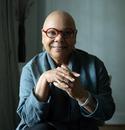 Ruth King is an international teacher in the Insight Meditation tradition, serving on the Teacher’s Council at Spirit Rock Meditation Center, CA. King formally managed training and organizational development at Levi Strauss and Intel corporations consulting to leaders on cultural change initiatives. Currently, King teaches the Mindful of Race Training Program nationwide to teams and organizations combining mindfulness principles with an exploration of our racial conditioning, its impact, and our potential. King has a master’s degree in Clinical Psychology and is the author of several publications including her most recent Mindful of Race: Transforming Racism from the Inside Out. www.RuthKing.net
Ruth King is an international teacher in the Insight Meditation tradition, serving on the Teacher’s Council at Spirit Rock Meditation Center, CA. King formally managed training and organizational development at Levi Strauss and Intel corporations consulting to leaders on cultural change initiatives. Currently, King teaches the Mindful of Race Training Program nationwide to teams and organizations combining mindfulness principles with an exploration of our racial conditioning, its impact, and our potential. King has a master’s degree in Clinical Psychology and is the author of several publications including her most recent Mindful of Race: Transforming Racism from the Inside Out. www.RuthKing.net
The post Exploring Interdependence Through the Lens of Blackness, Sponsored by C-Mind appeared first on RuthKing.net.
January 17, 2020
Lion’s Roar Highlights Buddhist Books by and for People of Color
In response to a query from a reader, our editors suggest some books by and for people of color.

Illustration by Nolan Pelletier.
Question: Can you recommend some Buddhist books by and for people of color?
Answer: It used to be that pretty much the only Buddhist books in English were written by Asian teachers or white Buddhists. Fortunately, Buddhism is changing and diversifying, and many of today’s most interesting and insightful Buddhist writers are people of color.
Here are seven books by and for Buddhists of color to get you started: Taming the Ox: Buddhist Stories and Reflections on Politics, Race, Culture, and Spiritual Practice, by Charles R. Johnson (Shambhala); Mindful of Race: Transforming Racism from the Inside Out, by Ruth King (Sounds True); Sanctuary: A Meditation on Home, Homelessness, and Belonging, by Zenju Earthlyn Manuel (Wisdom); A Fierce Heart: Finding Strength, Courage, and Wisdom in Any Moment, by Spring Washam (Parallax); Radical Dharma: Talking Race, Love, and Liberation, by Rev. angel Kyodo williams and Lama Rod Owens with Jasmine Syedullah (North Atlantic Books); Dreaming Me: Black, Baptist, and Buddhist—One Woman’s Spiritual Journey, by Jan Willis (Wisdom); Awakening Together: The Spiritual Practice of Inclusivity and Community, by Larry Yang (Wisdom).
Click to share on Facebook (Opens in new window)
Click to share on Twitter (Opens in new window)
Click to share on Pinterest (Opens in new window)
Click to share on Reddit (Opens in new window)
The post Lion’s Roar Highlights Buddhist Books by and for People of Color appeared first on RuthKing.net.
November 20, 2019
Serendipitous Encounter: It’s Toni Morrison’s Fault!
Our race-inflected culture not only exists, it thrives. The question is whether it thrives as a virus or a bountiful harvest of possibilities. ~ Toni Morrison
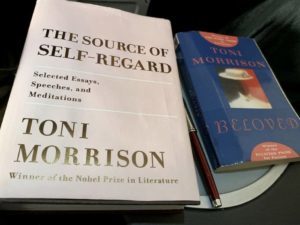
You likely know how it is, the bustle of getting to the airport and through security, then finally getting settled in your seat. I had just finished a week at Spirit Rock Meditation Center in California celebrating The Gathering of over 70 Buddhist teachers of African descent for five days followed by two days of training with over 350 black folks. Tired and beaming, I’m headed home to Charlotte, NC.
As I board the flight and began settling into my aisle seat, I pull out my read by the late Toni Morrison, The Source of Self-Regard. The white man sitting next to me is also settling in, and pulls out his read, Toni Morrison’s Beloved. We glance each other a smile and continue to settle in. Before takeoff, he orders a gin and orange juice and I order water without ice. We introduce ourselves. Let’s call him John.
John shares that he is returning from spending a week in Napa golfing with 8 college guys he’s known for over 25 years. This was their 10th year meeting annually, and he expressed pride in having such good friends at the age of 53. I look at him and realize he is the age of my son although he seems older. Maybe it is me that feels older. I laugh silently.
John seems energetic and shared that he was eager to get home to his wife and daughters. I wasn’t sure he would want to hear about where I had been, or maybe it was that I didn’t want to share it with a stranger. Instead, I shared that I had read just about everything Toni Morrison had written and that this current book, apparently the last one published before her recent death, was the most profound in terms of character and craft. I asked John what motivated him to read Beloved. He said that he had purchased the book years ago but had never read it, and as he was leaving home for this trip, the book “fall off his shelf.” For some reason, a line in Beloved flooded my memory: “…You just can’t mishandle creatures and expect success.” Next, I thought: What a ride this read will be for him. He ordered another gin and orange juice before take-off.
After take-off, we settled into our respective books. I had one chapter remaining in The Source of Self-Regard. As with Morrison’s other publications, it’s not a fast read, more a savoring. I often will read and re-read a paragraph then ponder it for a while before reading on. I’m mostly in awe at how Morrison is persistent in her message to talk “to” black people, not talk “for” them, and how her focus is not on slavery per se, but rather on black culture, interior pain, and character. This last chapter had me feeling satiated, sitting up straighter, clear, centered, and fortified by her words, all this while feeling deeply satisfied from the field of wise care I had bathed in with other Black Buddhist teachers and practitioners. I wanted for nothing!
I glanced over at John, who was also into Beloved. He seemed tight and edgy. I recall feeling that way when I read Beloved years ago. He, too, reads then puts the book down, then returns to reading. He seemed to be about one-third of the way into the book. He ordered another gin and orange juice. I wonder if he was reading Chapter 16 (yes, I remember it vividly), where Sethe instinctually decides to kill her children instead of allowing them to be taken and sold into slavery. That moment when, once read, we can’t help but ask: Is this criminal? What is the greater crime? Or maybe he was squirming in his seat because he was reading about Sethe being held down and beaten while the white boys stole milk from her breast, leaving nothing for her children.
Dinner is served. We rest the books. Surprisingly, John, now quite red-faced, pulls out a photo of his wife and children. I join him in this prideful moment. I wonder: Could it be that reading Beloved makes privilege palpable, making one cherish their loved ones even more? This was all that was spoken over our meal. I wondered if it felt dangerous or too risky for him to ask me about my life. Or worst, as least for me, that it never occurred to him.
I finished the last few pages of The Source of Self Regard and closed the book, bringing it close to my heart. As an author, I’m deeply inspired by Morrison’s example. I marvel at her clarity and brilliance; how close she stays to her inside voice, and how brave she is to trust and share it unapologetically. I am grateful that she lived and that she taught us, and I can taste this goodness. I ordered a glass of red to toast the moment. I glanced over at John who was napping with Beloved at his chest and surrender on his face. Is he napping because this is what one must do from time to time when reading the dense forest of Morrison’s work, or was he napping because his gin and orange juice had finally caught up with him? It didn’t matter, really. Morrison’s work is meant to be meditative. My guess is that we were both somehow in the “scorched earth” of Morrison’s wise love. Herein lies the bountiful harvest of possibilities. ~ Ruth King
The post Serendipitous Encounter: It’s Toni Morrison’s Fault! appeared first on RuthKing.net.
January 30, 2019
Power & Heart: Black and Buddhist in America, Lions Roar
December 25, 2018
Mindful Magazine Rates Mindful of Race as #4 for the Year

[image error]As Editor-in-Chief of Mindful, I have the honor of receiving and reviewing hundreds of books over the course of a year. After careful review, only a handful make it into the pages of the magazine. Barry Boyce, Editor in Chief, Mindful Magaziune.
Of the nine recommendations, Mindful of Race was listed as Number 4 - check out their review below!

4. Mindful of Race: Transforming Racism from the Inside Out
By Ruth King, Sounds True
Long-overdue discussions around race in America are finally having a moment—one that needs to last a very long time. The Netflix series Dear White People recently released its second season, as did Donald Glover’s Atlanta on FX. Both were created by young African-Americans who have a lot to say, and unique and hard-hitting ways of putting problems of whiteness front and center.
The “post-racial America” illusionary bubble has been burst. Put simply, to imagine we are (or even aspire to be) color-blind is just to be blind to reality. So, where is mindfulness in all this? Is the spread of this practice, touted as something truly transformational, making a dent anywhere in our understanding and our race relations? If Ruth King has her way, it will. With Mindful of Race, King joins other voices demanding contemporary mindfulness practice go beyond being another luxury of the privileged to become something that enables us to explore deep habits together in ways that effect real change.
King calls racism a “heart disease” that can go unnoticed and untreated for a long time. In response, she developed a three-and-a-half-day program with the same name as the book that “brings mindful inquiry to an examination of racial conditioning and social distress.” She unfolds her training on the page in three phases: In Diagnosis, we uncover “the narrative we hold along racial lines”; in Mindfulness—Heart Surgery, meditation practice helps us investigate deeply while “softening the grip of the tension” from emotions triggered by going to rarely explored places; and Recovery is about how we can spread understanding, caring, and equanimity about race from our inner circle to the bigger circles in the world.
The post Mindful Magazine Rates Mindful of Race as #4 for the Year appeared first on RuthKing.net.
October 28, 2018
The Gathering – Black & Buddhist Teachers In America
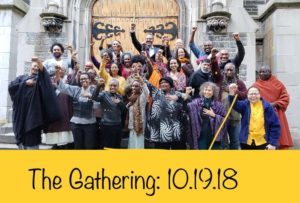 I’m just back from The Gathering – a historic meeting of Buddhist teachers of black African descent across the United States and across Buddhist traditions, held in New York. It was an amazing weekend of nurturing engagement, connecting on issues common and distinct to our experience.
I’m just back from The Gathering – a historic meeting of Buddhist teachers of black African descent across the United States and across Buddhist traditions, held in New York. It was an amazing weekend of nurturing engagement, connecting on issues common and distinct to our experience.
The weekend culminated with a public dialogue on “Black & Buddhist in America,” a conversation about dharma, the state of the world, and what it means to be a black Buddhist in America today. Over 250 people attended and I was one of over a dozen panel speakers.
The Gathering was co-hosted by Lion’s Roar and Union Theological Seminary’s Thích Nhất Hạnh Program for Engaged Buddhism, with support from the Arthur Vining Davis Foundations, the Hemera Foundation, and the Frederick P. Lenz Foundation.
Gratitude to the steering committee for The Gathering: Myokei Caine-Barett, Jules Shuzen Harris, Rev. angel Kyodo Williams, Gaylon Ferguson, Konda Mason, and Gina Sharpe, and to Jessica de Jesus for fabulous support.
There are no words!
Enjoy the youtube of the Black & Buddhist panels and Q&A.
The post The Gathering – Black & Buddhist Teachers In America appeared first on RuthKing.net.
October 22, 2018
The Washington Informer – Dharma Talk as Sacred Space Away from Racism
Jacqueline Fuller, reporter for The Washington Informer, attended the IMCW sponsored event for POC at the Potter House Cafe in Washington, DC. I hope you enjoy her reflections!
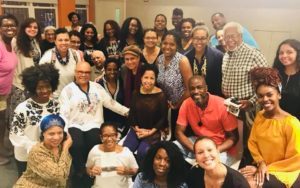
The post The Washington Informer – Dharma Talk as Sacred Space Away from Racism appeared first on RuthKing.net.
September 21, 2018
You Better Vote!
A country is only as strong as the people who make it up and the country turns into what people want it to become… We made the world we’re living in, and we have to make it over. ~ James Baldwin, Notes from a Hypothetical Novel
In the United States, we exist within a federal republic governed by the constitution controlled by the president, the congress, and federal courts. Many of our ancestors experienced much abuse for the right to vote—insisting on participating in a system that was never made with them in mind. It is now both a right and a privilege that we must take seriously because this system governs every aspect of our day to day lives, and is failing.
To become politically literate and involved, we need to know the racial biases of our state representatives, governor, mayor, city council, senators, federal and supreme court officials, and other party officials. We should know the jurisdictions in which we live, the school districts in our state and how they are funded, and how legislation is proposed and laws passed. This also means that when we receive those convoluted and intimidating voting ballots, we must get together with one or two other people and do a bit of research to be better informed of our choices—and then go vote. But we can’t stop there. We must also hold those elected accountable for their pronouncements and actions.
When we opt out of this civil responsibility, we become both victims and targets. Poor people and communities of color are often targets of infrastructure neglect, inadequate schools, unhealthy food, crime, racial profiling, water testing, oil drilling, and poor natural disaster response. Political neglect and greed agendas are influenced by our involvement or lack thereof in the political system. To ignore the significance of the political systems that control our lives is to dishonor the work of our ancestors, abuse the generosity of the earth, and work against a culture of care.
The voting process is what put the people who govern our lives into office. If we do not participate in the electoral process, we can’t change its dysfunction, and we cannot influence decisions and politics that impact our communities. We may not like the system or distrust it, and many of us may not understand how it works, but it is the system we have. And we need to know how it works before we can change it or create a new one.
There are people within your community who are politically savvy and resourceful. Seek them out and learn from them. Do a Google search and find out how things work in your district. You have about 30 days before the next election. Vote and take your family to vote in this critical election.
Learn everything you need to vote here at Vote.Org.
The post You Better Vote! appeared first on RuthKing.net.
September 14, 2018
Advice to Emery by Charles Johnson
In Charles Johnson's recent essay, Advice To Emery, published in the October edition of 3rd Act Magazine, he offers 10 points of advice for his grandson, Emery. I was delighted to discover that words from Mindful of Race were included as point number 2!
In speaking with Dr. Johnson about this inspiring essay, he shares: When I was writing this essay, your words - so clear, so accurate, so inspiring - were foremost in my thoughts. You explained the traditional, three Buddhist "marks" of existence so beautifully (and in terms a contemporary Westerner can understand) that I simply had to let readers hear your voice. Thank you! I believe your book (and you) are exactly what we need at this challenging moment in history. Three deep bows, Chuck
I'm beaming!
Charles Johnson is a MacArthur Fellow and professor emeritus at the University of Washington. His fiction includes Dr. King's Refrigerator, Dreamer, Faith, and Middle Passage, for which he won the National Book Award. He is also the author of Turning the Wheel: Essays on Buddhism and Writing, and Taming the Ox: Buddhist Stories and Reflections on Politics, Race, Culture, and Spiritual Practice. His new collection of short stories Night Hawks, was released this spring. He lives in Seattle. Read his book review of Mindful of Race.
The post Advice to Emery by Charles Johnson appeared first on RuthKing.net.
Ruth King's Blog
- Ruth King's profile
- 53 followers


